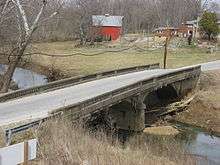Daniel B. Luten
| Daniel Benjamin Luten civil engineer, inventor and bridge builder | |
|---|---|
| Born |
December 26, 1869 Grand Rapids, Michigan |
| Died |
July 3, 1946 Indianapolis, Indiana, buried Spring Vale Cemetery, Lafayette, Indiana |
| Alma mater | University of Michigan |
Daniel B. Luten also known as Daniel Benjamin Luten (Dec. 26, 1869-July 3, 1946) was an American bridge builder and engineer based in Indianapolis, Indiana.[1]
He designed and patented the Luten arch, a type of concrete arch bridge. He obtained more than 30 patents eventually, including various refinements of design that used transverse and other reinforcement which allowed bridges to be lighter. "By 1919, Luten claimed to have designed some 17,000 arches, and stated that examples of his designs could be found in all but three states of the Union. Indiana alone had some 2,000 Luten arches."[2] He was born in Grand Rapids, Michigan in 1869.[1]
He graduated from the University of Michigan in 1894, in civil engineering.[2]:4 He was an instructor, in architectural and sanitary engineering, for Purdue University from 1895 to 1900.[1] He resigned in 1900 to conduct the bridge company work.
A number of bridges that are listed on the U.S. National Register of Historic Places are credited to him, including (with specific attribution):
- Beck's Mill Bridge, Carries Beck's Mill Road over Mill Creek, Salem, IN (Luten, Daniel B.), NRHP-listed[3]
- Canyon Padre Bridge, Abandoned grade of US 66 over Padre Canyon, Flagstaff, AZ (Luten,Daniel B.), NRHP-listed[3]
- Carrollton Bridge, Carrollton Rd. across Wabash R., Delphi, IN (Luten, Daniel B.), NRHP-listed[3]
- Dumbarton Bridge (Washington, D.C.), Q Street across Rock Creek Park, Washington, D.C.[4]
- Holbrook Bridge, Abandoned grade of US 70 over the Little Colorado River, 4.2 mi. SE of Holbrook, AZ (Luten,Daniel B.), NRHP-listed[3]
- Kelvin Bridge, Florence-Kelvin Hwy. over the Gila River, Kelvin, AZ (Luten,Daniel), NRHP-listed[3]
- Putnam County Bridge No. 159, Co. Rd. 650 W. over Big Walnut Cr., Reelsville, IN (Luten, Daniel B.), NRHP-listed[3]
- Moores Creek Bridge, Fort Pierce, Florida
- Winkelman Bridge, Old AZ 77 over the Gila River, Winkelman, AZ (Luten,Daniel), NRHP-listed[3]
- Wolcott Bridge, CO 131 at milepost 0.07, Wolcott, CO (Luten, Daniel B.), NRHP-listed
- Miami Bridges, Miami, Arizona five identical bridges across the town Bloody Tanks wash canal, 1921, Luten, Daniel, NRHP-listed
Additional Luten arch bridges are NRHP-listed that are attributed to the Luten Bridge Company or to Topeka Bridge & Iron Co., two firms which had use of Luten's patented designs.
References
- 1 2 3 Archives Staff. "Purdue University Archives and Special Collections: Daniel B. Luten papers, 1898-1924 [MSF 235]".
- 1 2
- 1 2 3 4 5 6 7 National Park Service (2009-03-13). "National Register Information System". National Register of Historic Places. National Park Service.
- ↑ National Park Service, U.S. Department of the Interior. "Historic American Engineering Record—Q Street Bridge (Dumbarton Bridge)—HAER No. DC-38" (PDF). Retrieved 23 September 2013.
